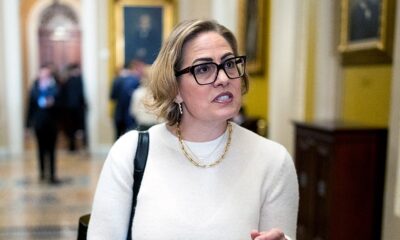Finance
Why Chinese banks are now vanishing

The savings and loan (S&L) crisis terrorised America’s banks for years. Starting in the mid-1980s, a mix of aggressive lending growth, poor risk controls and a property downturn contributed to the collapse or consolidation of over 1,000 small lending institutions. China’s smallest banks are now suffering from many of the same ailments. But until recently few have collapsed or merged with others.
That is starting to change. In the week ending June 24th, 40 Chinese banks vanished as they were absorbed into bigger ones. Not even at the height of the S&L crisis did lenders disappear at such a clip.

Finance
Newton Finance Committee Allocates $300,000 For New Management Positions in Mayor’s Office

The Newton Finance Committee gathered on Monday to discuss the allocation of a $300,000 transfer to two new management positions in the mayor’s office, chief of community services and chief of staff.
Chief Operating Officer (COO) Josh Morse, explained that these two new positions are aimed at both supporting the ongoing work and reducing the amount of work that comes to the COO’s table.
“It’s a growth period—more of an institutional growth, not necessarily budget growth,” Morse said.
Maureen Lemieux, chief financial officer (CFO) for the mayor’s office, emphasized that the funding request relies on repurposing existing salary funds that will not be used this fiscal year, rather than drawing from reserves or new revenue sources.
“We didn’t want to ask to take money from free cash or even the budget reserve,” Lemieux said. “We wanted to repurpose funds that had already been budgeted this year for salaries for these couple of positions.”
Instead of drawing smaller amounts of funds from several different departments, they decided to draw greater amounts from fewer departments to make the process simpler, explained Lemieux.
“We’re asking to take the money from three different departments,” Lemieux said.
Morse has worked for the city for the past 18 years, five of which he’s spent in the executive office, and he explained how past COOs have been trampled by their workload.
“It was always one single person managing all of the departments, supporting all of our city councilors, supporting 88,000 residents and 13 villages,” Morse said. “There were so many things that those incredible employees wanted to accomplish, but they just struggled to even get away from their desk because they were triple, quadruple booked every hour of the day.”
Morse also believes that working directly with people and stepping into the community is more important than looking at paperwork all day.
“Opportunities to really discuss what we can do as a city to help improve working conditions or just make sure that we’re adequately supporting and maximizing efficiencies with our frontline staff are important,” Morse said. “And conveying, you know, the message, about how much we support them and how much we really appreciate the work that they do and listening, really listening to them.”
This $300,000 transfer will not only benefit Morse and his ability to remain in close contact with the city, but it will also allow Lemieux to step down for retirement and train the new CFO, Lemieux explained.
“In addition to that, what we’re asking for is funding to allow me to retire in about 6 months, for us to be able to search for and bring on a new CFO before I go, so that we can have some time for an overlap between my tenure and when the new CFO would take over,” Lemieux said.
Although the committee ultimately agreed to the $300,000 budget transfer, they raised concerns about whether the vacant positions from which the funds were reallocated could be filled.
“We are absolutely not putting those positions on hold … there is absolutely no intent to be shorting that department,” Lemieux said.
Lemieux reiterated that the funds would be taken out of practicality rather than necessity, meaning that those departments could still hire if needed.
Morse then emphasized that these positions would provide needed growth to Newton by allowing the Mayor’s office to continue working efficiently and growing.
“If people see that upward mobility and support, they’re more likely to stick around, and it’s better for us because it makes us more resilient as a city,” Morse said.
Finance
Your access to this site has been limited by the site owner
About Wordfence
Wordfence is a security plugin installed on over 5 million WordPress sites. The owner of this site is using Wordfence to manage access to their site.
You can also read the documentation to learn about Wordfence’s blocking tools, or visit wordfence.com to learn more about Wordfence.
Finance
Despite key role in funding local bodies, state finance panels remain weak: Study – The Times of India

NEW DELHI: Only seven states — Rajasthan, Haryana, Tamil Nadu, Bihar, Kerala, Assam and Himachal Pradesh — have constituted all seven State Finance Commissions (SFCs) since 1992–93, when Parliament passed two constitutional amendment Acts to institutionalise local govts in urban and rural areas, according to a report published by Janaagraha, a think tank on local governance.This highlights how most state govts have failed to prioritise the institutionalisation of SFCs, which play a crucial role in devolution of finances to municipal and other local bodies. The study on SFCs flagged chronic delays in constituting these commissions, weakening them from inception. In many cases, SFCs were constituted with truncated tenures — sometimes as short as six months — and continued functioning through repeated extensions.In contrast, the Finance Commission (FC) set up by Centre has a fixed two-year term. The report noted that despite being the most predictable source of funding for cities and towns, SFCs remain neglected and unevenly empowered across states.It called for giving SFCs the same standing as FC. Its recommendations include fixing timelines for constituting SFCs, ensuring adequate staffing and data systems, and requiring state govts to present Action Taken Reports in their assemblies within six months, with clear explanations for accepted or rejected proposals.The report highlighted that transfers from state govts to local bodies, as recommended by SFCs, are, on average, nearly four times larger than those by FC, making SFCs vital to local govts. This is particularly significant given that most urban local bodies have weak own-source revenues.According to the report, own-source revenues of municipal bodies cover only 60–70% of their recurrent expenditure. They largely depend on state and central grants for capital investment and some operational spending. It also noted that 72% of urban infrastructure is financed by central and state govts.“Scheme funding is typically sector-linked, and its continuity cannot always be guaranteed. In comparison, devolutions recommended by FC and SFCs are meant to provide predictable, flexible and autonomous funding to meet local needs,” the report said. It added that in many states, SFC grants are the only predictable source of funds for municipal bodies — not just for asset creation but also for payment of staff salaries and operational and maintenance expenses.For instance, in Karnataka, SFC grants accounted for over 75% of total receipts in smaller municipalities and 40–50% in larger cities.
-

 Montana1 week ago
Montana1 week agoService door of Crans-Montana bar where 40 died in fire was locked from inside, owner says
-

 Delaware1 week ago
Delaware1 week agoMERR responds to dead humpback whale washed up near Bethany Beach
-

 Dallas, TX1 week ago
Dallas, TX1 week agoAnti-ICE protest outside Dallas City Hall follows deadly shooting in Minneapolis
-

 Virginia1 week ago
Virginia1 week agoVirginia Tech gains commitment from ACC transfer QB
-

 Montana1 week ago
Montana1 week ago‘It was apocalyptic’, woman tells Crans-Montana memorial service, as bar owner detained
-

 Minnesota1 week ago
Minnesota1 week agoICE arrests in Minnesota surge include numerous convicted child rapists, killers
-

 Lifestyle4 days ago
Lifestyle4 days agoJulio Iglesias accused of sexual assault as Spanish prosecutors study the allegations
-

 Oklahoma1 week ago
Oklahoma1 week agoMissing 12-year-old Oklahoma boy found safe























